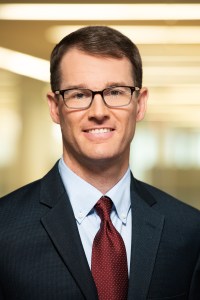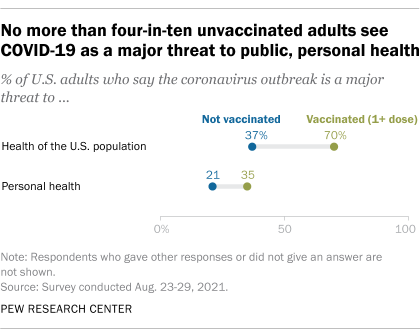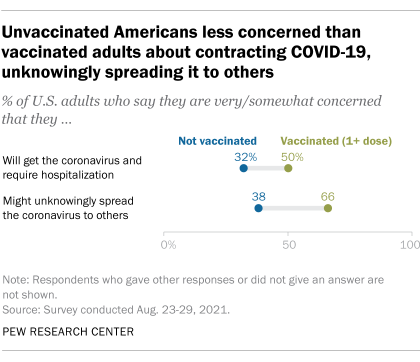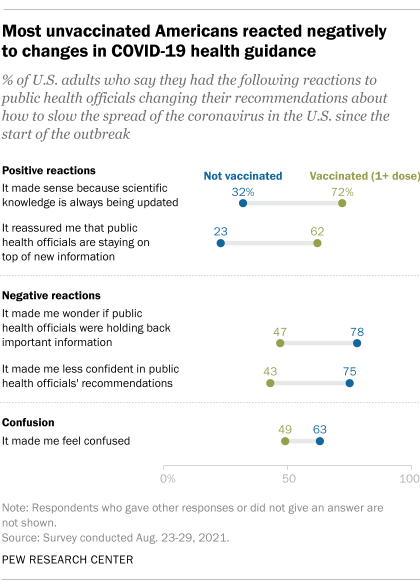Americans who are not vaccinated against COVID-19 are far more likely than vaccinated people to contract the coronavirus and to be hospitalized and die from it, according to the Centers for Disease Control and Prevention. Even so, a recent Pew Research Center survey finds they are less likely to be concerned about the health effects of the virus and to report wearing masks in stores or other businesses all or most of the time in the past month.
The lower levels of concern that unvaccinated adults express about the coronavirus outbreak are evident in a variety of questions in the Center’s survey, which was conducted Aug. 23 to 29. For example, adults who are not vaccinated are about half as likely as those who have received at least one vaccine dose to see COVID-19 as a major threat to the health of the U.S. population (37% vs. 70%) and 14 percentage points less likely to see it as a major threat to their own personal health (21% vs. 35%).
This Pew Research Center analysis compares the views of unvaccinated and vaccinated Americans on a variety of questions related to the public and personal health consequences of the COVID-19 pandemic. It is based on a survey of 10,348 U.S. adults, conducted from Aug. 23 to 29, 2021.
Everyone who took part in the survey is a member of Pew Research Center’s American Trends Panel (ATP), an online survey panel that is recruited through national, random sampling of residential addresses. This way, nearly all U.S. adults have a chance of selection. The survey is weighted to be representative of the U.S. adult population by gender, race, ethnicity, partisan affiliation, education and other categories. Read more about the ATP’s methodology. Here are the questions asked in the August survey, along with responses, and its methodology.
Similarly, unvaccinated adults are less likely than those who have received at least one vaccine dose (32% vs. 50%) to say they are very or somewhat concerned about getting the virus and requiring hospitalization. And they express less concern about unknowingly spreading the virus to others: Around four-in-ten unvaccinated Americans (38%) say they are very or somewhat concerned about this, compared with 66% among those who are either partially or fully vaccinated. Majorities of unvaccinated adults instead say they are not too or not at all concerned about getting the virus and requiring hospitalization (67%) and unknowingly spreading it to other people (61%).
Unvaccinated Americans also differ notably from partially or fully vaccinated Americans when it comes to wearing masks in public places. About four-in-ten unvaccinated adults (37%) say they have worn a mask in stores or other businesses all or most of the time in the past month, compared with 59% among those who are partially or fully vaccinated. (To some extent, these differences may reflect geographic differences in rules regarding mask-wearing in businesses.)
Overall, 26% of U.S. adults say they have not been vaccinated against COVID-19. But the percentage of Americans who are unvaccinated is higher among some groups, including younger adults, those with less formal education, those who lack health insurance and those who identify as Republican or lean to the Republican Party.
Many unvaccinated Americans express skepticism about public health officials’ guidance
So why are unvaccinated Americans less concerned about the coronavirus, despite public health guidance that suggests they should be more concerned? The Center’s survey shows that these Americans have clear doubts not just about the vaccines, but about public health officials’ COVID-19 guidance more broadly.
Only 21% of those who have not received a vaccine say they have a great deal or fair amount of confidence in the vaccine research and development process – compared with 91% of those who are partially or fully vaccinated.
Unvaccinated adults are far less likely than vaccinated adults (23% vs. 91%) to say the following statement describes their views very or somewhat well: “Vaccines are the best way to protect Americans from COVID-19.” Conversely, they are far more likely than vaccinated adults (81% vs. 54%) to say this statement describes their views very or somewhat well: “We don’t really know yet if there are serious health risks from COVID-19 vaccines.”
Those who are not vaccinated against COVID-19 are notably skeptical about the guidance of public health officials when it comes to the pandemic. Eight-in-ten unvaccinated adults, for instance, say the following statement describes their beliefs very or somewhat well: “Public health officials are not telling us everything they know about COVID-19 vaccines.” Far fewer partially or fully vaccinated Americans (44%) say this statement describes their views very or somewhat well.
Unvaccinated adults are also much more likely than their vaccinated counterparts to report negative reactions to health officials’ shifting guidance about how to slow the spread of the virus. Around eight-in-ten unvaccinated Americans (78%) – compared with 47% of vaccinated adults – say the changing health recommendations have made them wonder if officials were holding back important information. And three-quarters of unvaccinated Americans say the shifting guidance has made them less confident in public health officials’ recommendations, compared with 43% of those who have received at least one dose of a COVID-19 vaccine.
Overall, around a third of unvaccinated adults (31%) say public health officials like those at the CDC have done an excellent or good job responding to the coronavirus outbreak – far below the 70% of partially or fully vaccinated adults who say the same. Two-thirds of unvaccinated adults say public health officials have done only a fair or poor job.
Note: Here are the questions asked for this report, along with responses, and its methodology.






